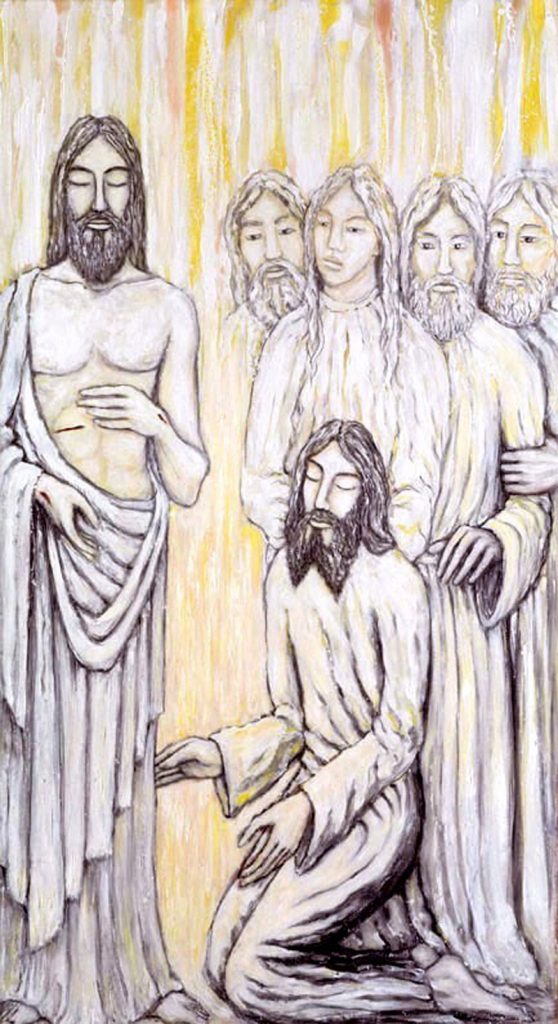Daily Office Readings for the Feast of St. Thomas, the Apostle:
PM Psalm 27
Poor Thomas! Because of the significance of the Gospel accounts of the resurrected Jesus, Thomas gets a bad rep as the “doubter”, obscuring two other places in the Gospel where we get a little fuller picture of him.
For starters, he was “Loyal Thomas”–even loyal to the point of being willing to risk death. In John 11, when Jesus hears his friend Lazarus is ill, and he suggests going back to Judea, the disciples are not terribly keen on the idea. “Are you crazy? If you recall, they tried to stone us back there–and now you want to go back?”
Yet Thomas is all in. “Let us also go, so that we may die with him.”
Our additional info comes from today’s Gospel reading, in the context of the Last Supper. Jesus says, “In my Father’s house there are many dwelling places. If it were not so, would I have told you that I go to prepare a place for you? And if I go and prepare a place for you, I will come again and will take you to myself, so that where I am, there you may be also. And you know the way to the place where I am going.”
Here we see “Earnestly Inquisitive Thomas” in his reply: “Lord, we do not know where you are going. How can we know the way?”
History is not consistently helpful in letting us in on the rest of Thomas’ life. The apocryphal literature once attributed to him (but no longer) and about him, ranges from fancifully embellished to downright sketchy (although my personal favorite is the 8th act in The Acts of Thomas, you can read a synopsis of that work here.)
Finally, although we don’t have supportive archaeological or contemporary historical evidence to back tradition, at least we have 3rd and 4th century accounts that Thomas traveled to India, namely the area that is now the state of Kerala, as a missioner. Today, this province is approximately 18% Christian, according to Indian census data, compared to the typical 2.3% for India as a whole (and one of them was a pathologist colleague of mine many years ago. She definitely believed Thomas traveled to India, and that’s good enough for me, despite my own leanings toward doubt and skepticism.) This is not the kind of life path a chronic doubter would take. Yet, poor old Thomas will probably be known as “Doubting Thomas” for many generations to come.
I suspect many of us picked up a name, or a nickname, or a moniker or reputation of some sort, along the road of life, that adequately describes who we are more fully. Perhaps the name and the story represents us at one of our lesser-than-average moments, or us at a time when we still had some learning or maturing to do. Perhaps we have to suffer through high school reunions or family get-togethers having to hear the same tired old story about ourselves that doesn’t match up with us now–and, like the apocryphal stories, about Thomas, those stories got a bit embellished over the years (hopefully, though, not as much.) We yearn for a different story, don’t we?
Trying to figure out who “the real Thomas” is, perhaps a good lesson for all of us. We simply don’t know enough about most people to know them well, except for perhaps the most intimate people in our lives. We carry old images about people we used to know better once upon a time. We think we know the personas of celebrities and public figures, when in reality, we know very little about them other than what we read or watch about them.
The joy, of course, is when we discover when someone we once thought of negatively, turns out to be a much more interesting and rich person than we once believed. How many times have we discounted someone as snobbish, when in reality they were simply way more introverted than we knew? How often have we based our opinion on a person from another person’s negative opinion, or a negative account of them? These things can be real humility checks when we find out a larger truth. We may never know much about Thomas, but we can at least rest assured that he was far more than his doubts. As Christians, we are continually called to try to see situations and people from more than one vantage point–which is at the heart of seeing Christ in everyone when living out our Baptismal covenant.
When is a time you “got it wrong” about someone?
Maria Evans splits her week between being a pathologist and laboratory director in Kirksville, MO, and gratefully serving in the Episcopal Diocese of Missouri . She presently serves as Interim Assistant Priest at two churches, Church of the Good Shepherd in Town and Country, MO, and St. Luke’s Episcopal Church in Manchester, MO, as they explore a shared ministry model.

